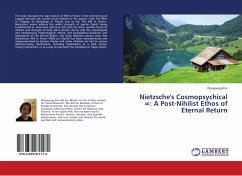Nietzsche's theme of the affirmation of life is very broad. In his youthful writings, we can find an aesthetic-cultural project aimed at overcoming pessimism. However, in his middle and mature writings, the philosopher's project seems to gain in depth and breadth. In this case, Nietzsche aims to overcome metaphysical thinking, which divides the world into a polarity of opposites, because such thinking encloses man in a negation of life. In metaphysics, man comes to value a reality that doesn't exist to the detriment of life itself, for example: heaven instead of earth, soul instead of body, God instead of man. In his later texts, Nietzsche developed the project of the will to power and began to interpret the world based on the concept of impulse. In this new worldview, man comes to accept destruction and creation, health and illness, death and life. Therefore, Nietzsche's affirmation of life means reinterpreting the world based on the notion of impulse, enabling a new way of thinking and, consequently, loving life in its entirety.
Bitte wählen Sie Ihr Anliegen aus.
Rechnungen
Retourenschein anfordern
Bestellstatus
Storno








